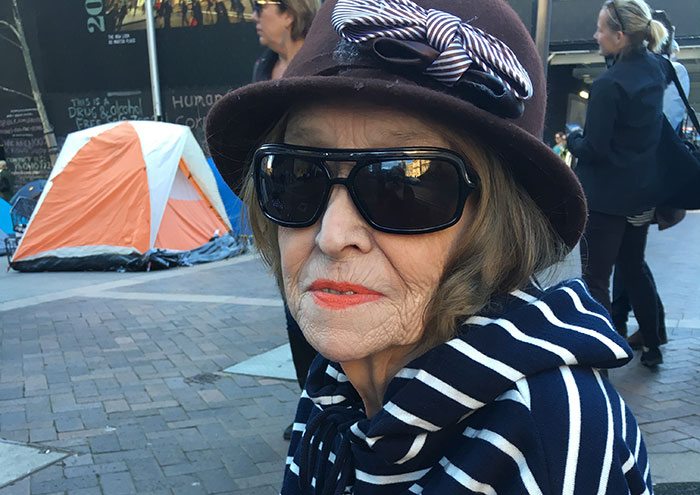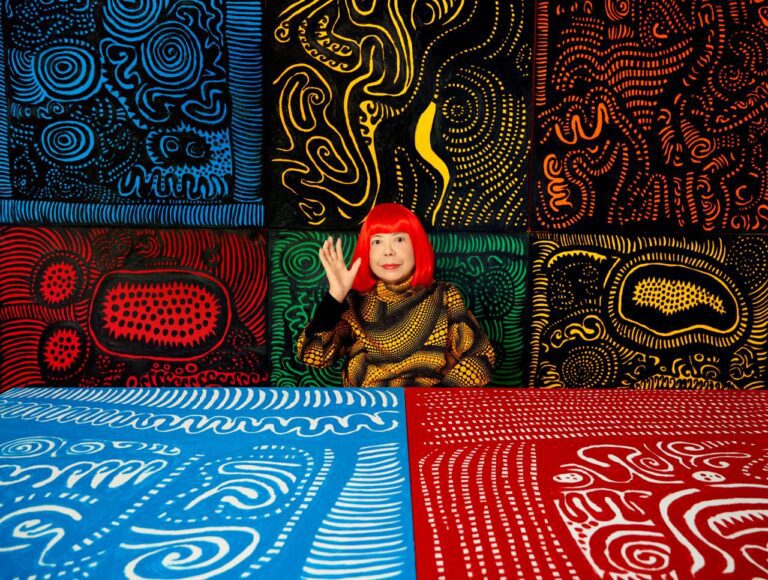Doreen Benzie
(Above)
Before new legislation was passed in the NSW Parliament to effectively close down the homeless camp at Martin Place, the city’s homeless had spent more than six months outside the Reserve Bank, to gather, to eat, to sleep and to protest the skyrocketing prices of Sydney’s rental market, that many, even with jobs, could no longer afford. Two days before the camp was packed up, Doreen Benzie was there. She shuffled around the tents, heavy on a walking stick. “It’s horrible for them, isn’t it?” she says. “I’ve been there, you know.” After an initial introductory chat, she tells her story of what it’s like to be homeless.
“Unless you’ve experienced [homelessness], you can’t comprehend what it’s like. Inside, it tears you apart. I was only eight years old when my dad went into the army [in WWII]. My mother wanted a good time and we were left to help ourselves. [My mother] didn’t love me. She was ironing one day and she said, ‘You can go if you like.’ She meant out [of the home] altogether. I loved her in a way, but it wasn’t working and I knew it, so I had to go. The war was on and there was a lot of hunger. I used to go to bed and cry my eyes out and think, ‘Mum doesn’t want me. Mum doesn’t want me.’ A little boy [said to me recently], ‘I want my mummy.’ If you knew how many kids are homeless today, you’d go mad.
Later I met this guy, got married to him. I was very young then, but it was no point doing that [getting married] because it doesn’t work. He went off with somebody else. I left my sister for this man. I thought he would have taken her on, but he left me anyway so, well, you get over that and you start again. Then I met somebody else with money, big money. He died and I was on my own again.
I love those guys [the homeless] because they have nothing and it brings back memories of times when I had nothing. It’s hard, so hard. I would say I’m only just coming around now at this age … But I’m alive, you see, I’m someone who wants to go, go, go. I really do. You’ve got to give it [love] out and help people; they want lovin’ too. If you just give them a little cuddle, they’re so happy.”
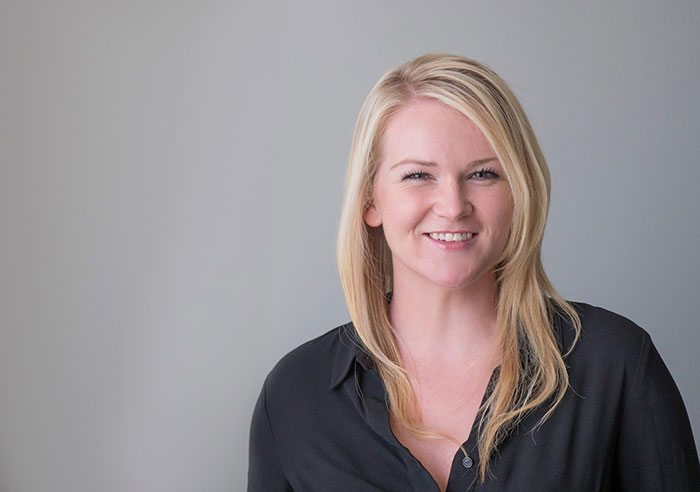
Kylie Travers
Women and children may experience homelessness as the result of domestic violence. In 2012, Kylie Travers found herself homeless with her two daughters. She shares her story about how she got through that time in her life to become the CEO of her own company.
“My daughters and I have been homeless twice. Both times my now ex-husband was abusive so we ended up homeless because of domestic violence. The first time we stayed in a friend’s garage and the second time we couch surfed and slept wherever we could.
I was living in Sydney at the time so I pushed really hard to be able to move back to Canberra, which is where my family is. I felt if I could get back to Canberra, I could rebuild my life. And so, mid-2013, I managed to get back, got a rental property, enrolled my daughters in school … then I started to do some volunteer work with charities, particularly ones around homelessness, and in 2014 I founded my company [Occasio Enterprises] and everything continued to go up.
My keynote [as a spokesperson] is how to turn obstacles into opportunities to accelerate your business and life. I had a very specific goal setting method [to get where I am today]. I also created a community … I honestly couldn’t have done anything without my best friend and my family. They’ve just been incredible. I had a psychologist at the time [I became homeless] and he actually gave me free sessions, which was so good of him. He helped me out a lot.
I did really try to focus on where it was that I wanted to be, even at the worst times. I’d repeat Carl Jung’s quote: ‘I am not what happened to me. I am what I choose to become.’ For me, it had to be true. Things needed to change and that was only going to happen if I changed them.
There’s no quick fix for homelessness. For a lot of women who have experienced domestic violence and homelessness, it isn’t uncommon a few years later [after they’ve found a home] for them to experience severe health issues. Being aware as a community of everything that comes with being homeless is really important. It’s not just about getting a home; it’s also about continuing support. People who have been through homelessness often end up homeless again … being aware of that can help prevent it from happening again.”
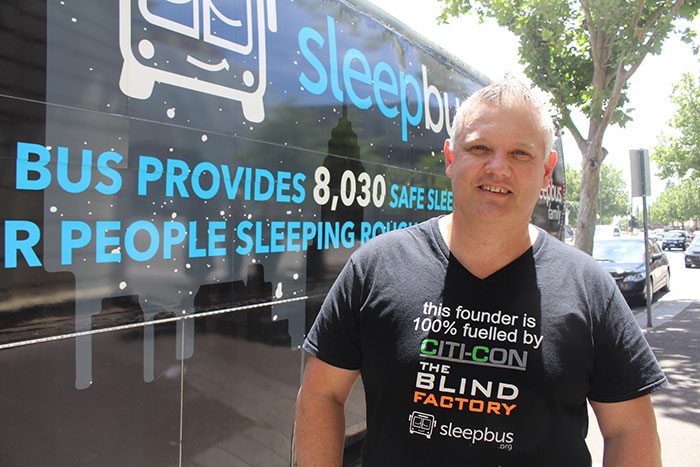
Simon Rowe
Years after Simon Rowe’s own experience of homelessness, he met the “tiredest man I’d ever seen”, which led him to start sleepbus, an initiative that provides a safe place for people on the streets to sleep at night, in a comfortable pod on a converted bus with its own caretaker.
“I was living in Adelaide at the time. I had a job, I was 19, life was pretty good, but I wasn’t earning that much money and wasn’t really saving any money and my car blew up. I needed the car to get to the job so I had to use the rent money to fix the car so I could keep the job. I thought maybe they’d let me off with the rent if I can pay it back … turns out they didn’t let me off and I was evicted. I lived in my car for the next four months.
The biggest killer was the boredom and frustration, and I think about that with people on the streets now. What do they do with their day? It becomes a vicious cycle of ‘I don’t have the energy or money to do anything, so I sit and then I get unhealthy or cold or people start to hassle me’. Our idea [with sleepbus] was to try and circumvent that deeper cycle of homelessness. If we can keep people safe, healthy and well rested, so they can think clearly, maybe that’s a way to find a path out of that situation.
I get that [homelessness] is a confronting thing and has a connotation that isn’t pleasant, that people would rather avoid. You also get the attitude that because it’s not happening in my backyard, why would I need to do anything about it. But just because it’s not in your backyard, it doesn’t mean it doesn’t affect you. Money being spent on hospitals, which are being filled up by homeless people that get sick because they’re out on the street or they just go to the emergency rooms because that’s a warmer and safer place to be … that’s clogging up the system which costs you more money.
The catalyst in the end [to create sleepbus] was when I told my kids about the homeless guy I saw trying to sleep in a crowded place in the middle of the day. He told me he couldn’t get any sleep at night because it wasn’t safe. My kids said, ‘You should do something about it.’”
Visit sleepbus.org to find out more about the ‘something’ Rowe did.
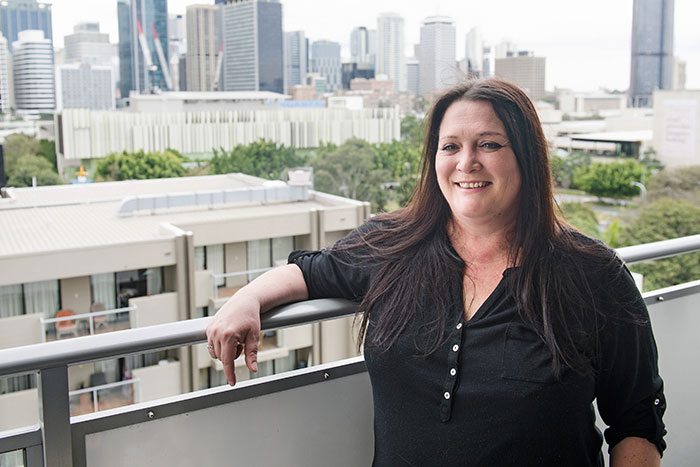
Sussana
An active and hard-working member of her community, Sussana says she never really understood how someone could be homeless with the support services available in Australia. She soon discovered, however, that if you have a disability, you’re more susceptible to homelessness because you may not be able to work – or can only work on a casual or part-time basis. As a low-income earner it can become increasingly difficult to financially support yourself, particularly when rental costs continue to creep upwards. Sussana tells her story of homelessness and how, through the affirmative actions of others, she was finally able to find a place to call home.
“I have disabilities, but that has never stopped me. Even though I have only been able to work part-time, I have tried my hardest to help myself and others. I educated myself, got my degree and worked as much as I could. But it wasn’t enough. When I couldn’t afford the rent [on a unit I lived in for two years], I was forced to give it up. I had a good rental history, but every real estate was not interested, saying my disability pension was not enough income [to pay the rent].
I lived from one friend’s place to another until I felt such a burden … The Salvation Army gave me a list of places to call. I used all my phone credit to call about 30 to 40 places, but because I didn’t have a cent to my name, they couldn’t take me in. I felt shame and embarrassment and, worse, fear. It was hard. I was constantly hungry. I remember slowly waking up from a dream where I was eating some fruit. It tasted sooooo good!
The stress of the situation took its toll and I had an emotional breakdown, requiring hospitalisation. It was there that I met another patient who gave me the phone number of a woman’s shelter with Anglicare. They took me in for three months and helped me find and apply to live at Brisbane Common Ground*.
Living at Common Ground has helped me to understand that even though I have experienced what I have, I am still a valued member of society. But I am still recovering, and I still feel shame, even after two years. Don’t think that every homeless person just needs to get a job. I am educated. I am worthy. I have contributed to society and will continue to do so when I recover. Help me recover by not compounding my lack of self-work, shame, or lack of confidence. The most important thing is to be kind.”
* Common Ground Queensland is a supportive housing organisation that was established in Brisbane, Australia, in 2008. Its objective is to provide supportive and affordable housing for people at risk of homelessness, or homeless. Visit commongroundqld.org.au to find out more.


